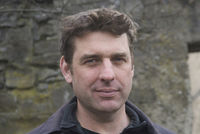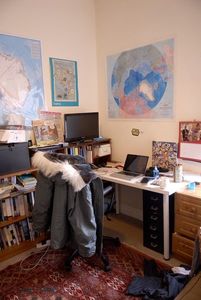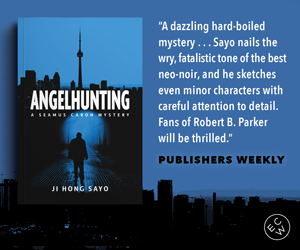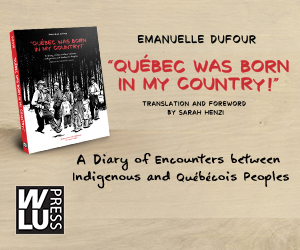At the Desk: Ed O'Loughlin
The doomed Franklin Expedition, which lost its entire crew during an exploration of the Northwest Passage, has long fascinated writers in Canada and around the world, but journalist and Man Booker Prize-nominated novelist Ed O’Loughlin brings an entirely new perspective to the mystery of the failed mission in his new novel Minds of Winter (House of Anansi Press).
Told through the contemporary lens of Fay Morgan and Nelson Nilsson, two strangers who meet in Inuvik, Northwest Territories while searching for answers about their respective families, the story focuses on the real life (and unsolved mystery) of the "Arnold 294", a chronometer from one of Franklin's ships which re-appeared in England more than 100 years after being declared lost in the tragedy of the expedition. No one knows how an distinctive piece of equipment made it from a ship with no survivors to the far side of the Atlantic, but the chronometer links Fay and Nelson's families, and in doing so, their current fates.
Words like "ambitious", "epic", "imaginative", and "stupendously good" have popped up repeatedly about Minds of Winter, and it is clear that O'Loughlin, widely considered one of the best historical novelists around, has created something hugely significant. The Arctic Book Review summed up the complex and thrilling novel's impact, calling it "the Franklin novel to end all Franklin novels".
We're excited to welcome Ed to Open Book today to share with us about his personal workspace, where Minds of Winter was created. He takes us into his Dublin home, telling us about his very relatable IKEA desk, a piece of Canadian Centennial memorabilia that is close to his heart (and which we're kind of coveting), and the coat he bought in Inuvik that ended up being too dramatic for even cold Irish winters.
At the Desk: Ed O'Loughlin on his Writing Space in Dublin
I work in the small box room at the top of the stairs in our house on the north side of Dublin. One side of the room is almost filled by a couch containing a foldout bed. It is covered in unsorted laundry, some of which has spilled onto the floor.
The “desk”, aligned against the outside wall, is in fact a basic Ikea table - a “Linnmon”, I believe - with screw-on “Adils” metal legs. It is not as untidy as usual right now: we had friends to dinner a few days ago, so I cleared the table off and took it downstairs for extra seating, and it hasn’t had time yet to fill up again with the usual junk. Underneath it is a small metal filing cabinet that I seldom now open.
Over the desk is a 1: 9,000,000 scale map of the North Circumpolar Region, published by Natural Resources Canada. I had it custom laminated so I could use it for eye-level reference whilst writing my latest novel, Minds of Winter. To my left, on the partition wall, is a similar map of Antarctica. Beneath this, two mis-matched bookshelves contain mostly books, many of which I have read. There is also a small flat screen TV which isn’t at present connected to any cable or aerial. Perhaps someday this room will be my den, and I’ll use it to watch sports.
Behind my chair is the door onto the landing. To the left of it, from where I sit, a Dyson vacuum cleaner, so old that the company has discontinued spares for it (though I still know where to look), is jammed between the couch and the wall. There are also several sagging cardboard boxes containing photos and family souvenirs and other bits and pieces that we recently retrieved from my sister’s half-forgotten storage unit. The storage depot was going out of business, so we felt obliged to go and clear the unit out.
Among these knick-knacks is a souvenir plate, produced for the centenary of Canada’s confederation in 1967. Painted in faux-engraving style, it shows a map of Canada dotted with little beavers and Inuit people and bears and voyageurs and that sort of thing. I was very taken with it as a small child, and was delighted when I recently rediscovered it in a box from the storage unit, wrapped in old newspapers. My mother told me I can keep the plate (it was mentioned in early drafts of my novel, which it partly inspired, though I cut that bit out in the end) but I had already put it it back in one of the boxes, and can’t remember which one. There is also a chance, quietly dismaying, that I may have put the plate somewhere else, perhaps for safe-keeping. I should go and look for it. There’s a space for it on the back wall.
On the floor is an Iranian carpet, one of four which I purchased in Tehran when I was a newspaper correspondent in the middle east. It is by far the classiest thing in this room, but the wheels of my swivel chair (Ikea again) are starting to fray it. It may have to go, for its own good.
Your CanLit News
Subscribe to Open Book’s newsletter to get local book events, literary content, writing tips, and more in your inbox
The room is cold in winter - for some reason, the coldest in the house. Fortunately, I have a lot of gear left over from a winter research trip to the Mackenzie delta. I wear some of it while I work - socks and fleece pants and gloves and the like - to save on heating: I’m alone in the house for most of the day, sitting still, more or less, and heating is expensive here. I used to own a Canada Goose “Resolute” parka, which I bought on impulse on sale in Inuvik, but it is never, ever cold enough in Ireland to justify wearing such a dramatic coat. So I sold it on eBay last year. If you really love something you have to let it go. I now make do with an old US Air Force surplus parka. It’s not the same, though.
The best thing about the room, apart from its proximity to the upstairs bathroom (the warmer of the two in the house), is the view from the front window. This looks out over the National Botanical Gardens, a beautiful 25 acre park, admission free seven days a week. Cheerful visitors come and go throughout the day. I try not to let them distract me from my writing, but on sunny days it isn’t easy. Again, though, I live in Ireland, so sunny days are rare.
___________________________________________
Ed O’Loughlin is an Irish-Canadian author and journalist. His first novel, Not Untrue and Not Unkind, was longlisted for the Man Booker Prize in 2009 and shortlisted for the Kerry Group Irish Fiction Award. His second novel, Toploader, was published in 2011. As a journalist, Ed reported from Africa for several papers, including the Irish Times. He was the Middle East correspondent for the Sydney Morning Herald and The Age of Melbourne. Ed was born in Toronto and raised in Ireland. He now lives in Dublin with his wife and two children.





